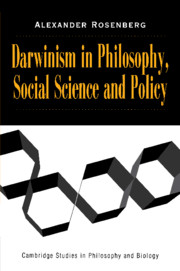Book contents
- Frontmatter
- Contents
- Introduction
- 1 A Field Guide to Recent Species of Naturalism
- 2 Naturalistic Epistemology for Eliminative Materialists
- 3 Limits to Biological Knowledge
- 4 Reductionism Redux: Computing the Embryo
- 5 What Happens to Genetics When Holism Runs Amok?
- 6 The Biological Justification of Ethics: A Best-Case Scenario
- 7 Moral Realism and Social Science
- 8 Contractarianism and the “Trolley” Problem
- 9 Does Evolutionary Theory Give Comfort or Inspiration to Economics?
- 10 The Political Philosophy of Biological Endowments: Some Considerations
- 11 Research Tactics and Economic Strategies: The Case of the Human Genome Project
- Bibliography
- Index
7 - Moral Realism and Social Science
Published online by Cambridge University Press: 06 July 2010
- Frontmatter
- Contents
- Introduction
- 1 A Field Guide to Recent Species of Naturalism
- 2 Naturalistic Epistemology for Eliminative Materialists
- 3 Limits to Biological Knowledge
- 4 Reductionism Redux: Computing the Embryo
- 5 What Happens to Genetics When Holism Runs Amok?
- 6 The Biological Justification of Ethics: A Best-Case Scenario
- 7 Moral Realism and Social Science
- 8 Contractarianism and the “Trolley” Problem
- 9 Does Evolutionary Theory Give Comfort or Inspiration to Economics?
- 10 The Political Philosophy of Biological Endowments: Some Considerations
- 11 Research Tactics and Economic Strategies: The Case of the Human Genome Project
- Bibliography
- Index
Summary
The traditional intersection between the philosophy of social science and moral philosophy has been the problem of value-freedom: whether theories in social science unavoidably reflect normative judgments, whether they can be or are free of them, and whether either of these alternatives is a good thing or not, given the aims and methods of empirical science in general. Despite its importance, this is a debate to which little both novel and reasonable has recently been added.
But the recent resurgence of interest in “moral realism” holds out the hope of a new approach to this issue, one likely to lend support to the opponents of moral neutrality, support from a direction in which they could not have expected it – the “scientistic” approach to theories about human behavior. For once moral realism is embraced, the attractiveness of deriving moral claims from descriptive social theories becomes very great.
REALISM AND NATURALISM
Moral realism is not just the thesis that at least some normative claims are definitely true or false. It also requires that at least some of them are in fact true. A moral realist who held that all ethical claims are just false could hardly be said to have offered a defense of ethical theories and claims. But if at least some moral claims are true, it behooves the moral realist to show how we can know which ones they are, and what the evidence for them is. But providing the metaphysics and epistemology moral realism needs has long been a problem. As Sayre-McCord [1988, p. 13] notes, “the common (mistaken) assumption is that the only realist positions available in ethics are those that embrace supernatural properties and special powers of moral intuition.”
- Type
- Chapter
- Information
- Darwinism in Philosophy, Social Science and Policy , pp. 137 - 156Publisher: Cambridge University PressPrint publication year: 2000

